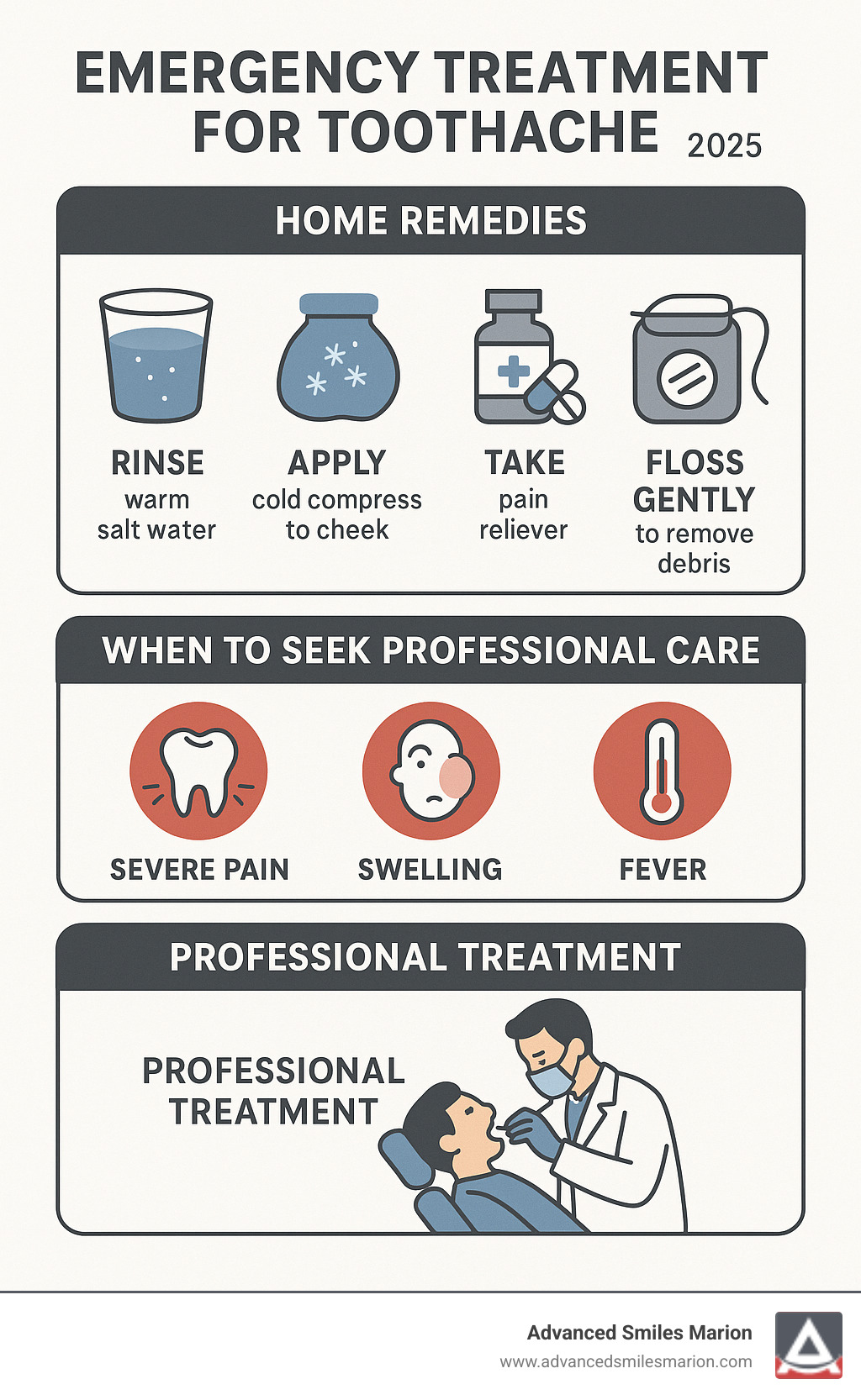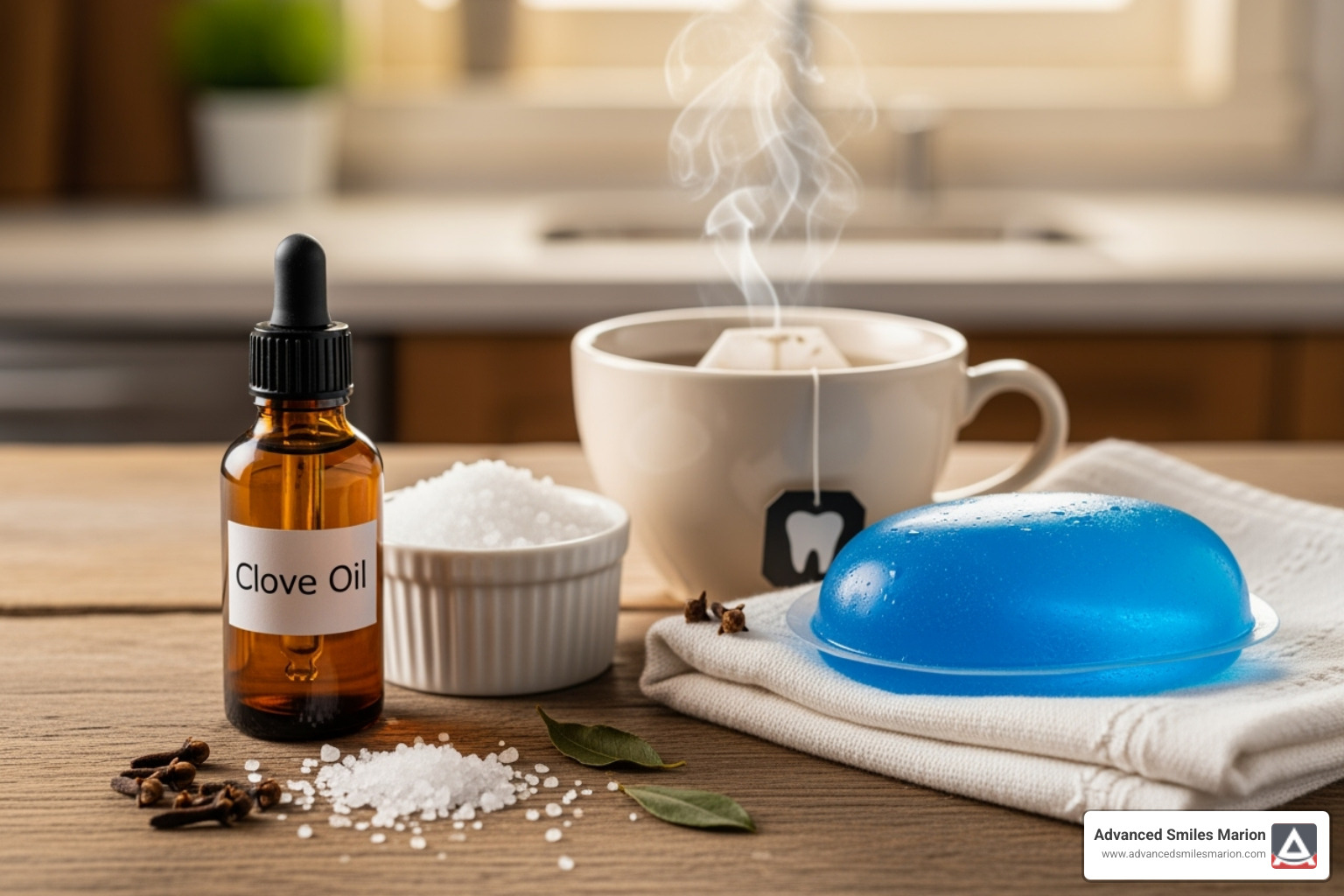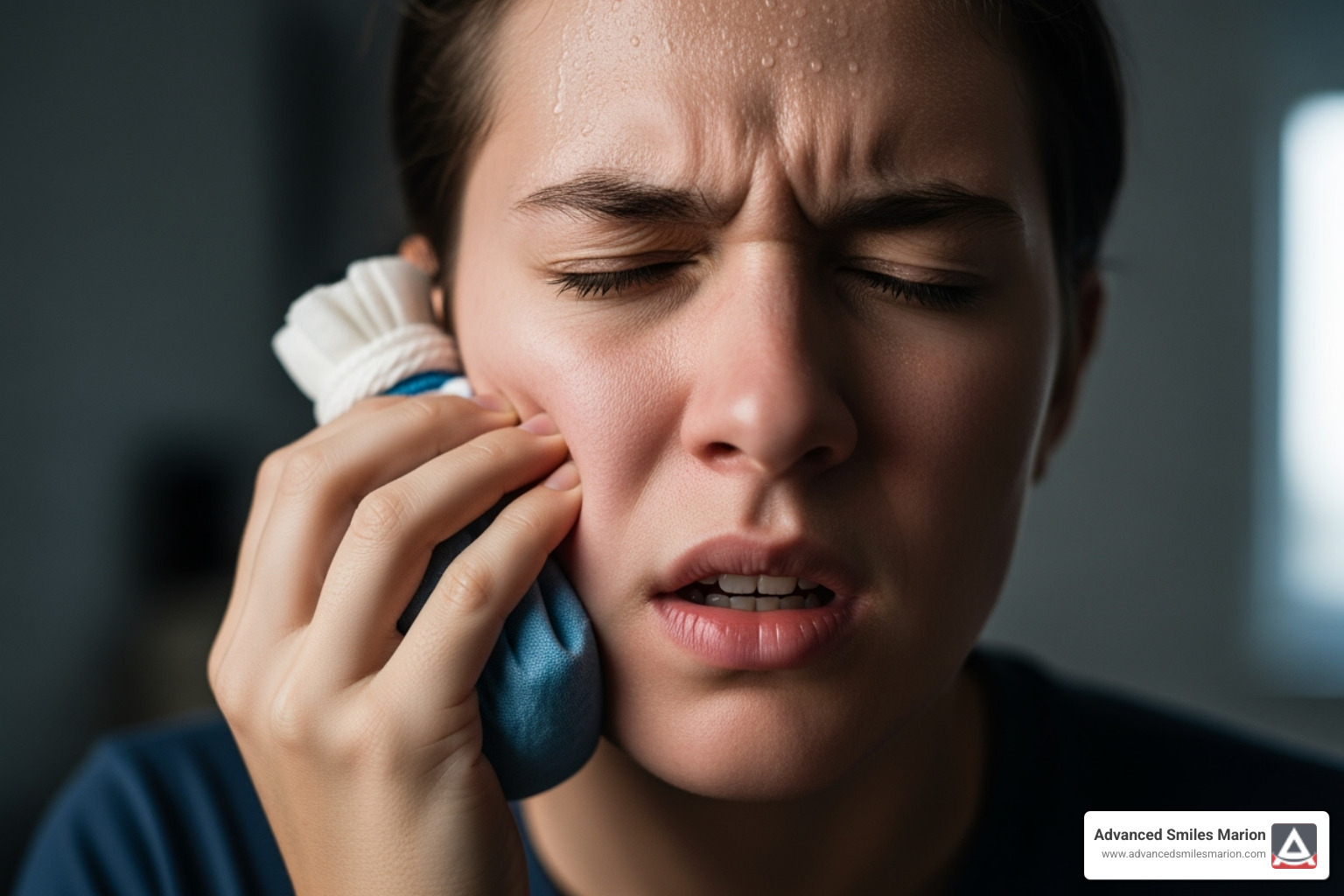Why Toothache Pain Demands Immediate Action
Emergency treatment for toothache can mean the difference between saving your tooth and losing it permanently. When severe tooth pain strikes, you need fast, effective relief that goes beyond temporary fixes.
Immediate Emergency Treatment Steps:
- Rinse with warm salt water (1/2 tsp salt in 8 oz water)
- Apply cold compress to cheek for 15-20 minutes
- Take ibuprofen or acetaminophen (never place aspirin on gums)
- Floss gently to remove trapped food particles
- Call your dentist immediately for same-day treatment
A toothache isn't just uncomfortable - it's your body's urgent warning that something is seriously wrong. The throbbing, sharp, or constant pain you're experiencing comes from inflammation in the tooth's pulp, where nerves and blood vessels live. This happens when bacteria invade through cracks, cavities, or damaged fillings.
Common causes include:
- Tooth decay reaching the nerve
- Dental abscess or infection
- Cracked or broken teeth
- Lost fillings or crowns
- Gum disease
- Impacted wisdom teeth
The longer you wait, the worse it gets. What starts as mild sensitivity can quickly become excruciating pain, facial swelling, and even life-threatening infection. More than five million teeth are knocked out or severely damaged each year, but many could be saved with prompt professional care.
The highly educated and involved dentists at Advanced Smiles Marion provide same-day emergency dental treatments, using advanced laser technology and pain-free techniques to address emergency treatment for toothache quickly and effectively. With their extensive training and commitment to continuing education, our dental team stays at the forefront of emergency dental care to ensure you get the relief you need when you need it most.

Easy emergency treatment for toothache word list:
What is a Toothache and Why Does it Hurt So Much?
If you've ever experienced a toothache, you know it's not just "a little discomfort" – it can be absolutely excruciating! A toothache is pain in or around your tooth that can range from mild sensitivity to severe, throbbing agony that makes it impossible to eat, sleep, or think about anything else.
The reason toothaches hurt so much comes down to anatomy. Inside each tooth is a soft core called the pulp, packed with nerves, blood vessels, and connective tissue. When this pulp becomes inflamed – whether from infection, injury, or decay – pressure builds up inside the rigid walls of your tooth. Imagine a balloon being inflated inside a box that can't expand. That pressure has nowhere to go, so it presses directly on those sensitive nerves.
Common causes of toothaches include tooth decay (the most frequent culprit), gum disease, a cracked tooth, an abscess, or even a sinus infection that creates referred pain in your upper teeth.
Understanding the Most Common Causes
When you're dealing with tooth pain, understanding what's causing it helps you know how urgently you need emergency treatment for toothache. Our experienced dentists at Advanced Smiles Marion are skilled at quickly identifying the source of your pain.
Tooth decay remains the number one cause of toothaches for people of all ages. When bacteria feast on sugars and starches in your mouth, they produce acids that eat through your tooth enamel, creating cavities. Left untreated, these cavities deepen until they reach that sensitive pulp we talked about – and that's when the real pain begins.
A dental abscess is a serious infection where pus forms at the root of your tooth or in your gums. This usually happens when bacteria enter through an untreated cavity or crack. The pain from an abscess is often described as severe, persistent, and throbbing, sometimes accompanied by fever and facial swelling.
Damaged fillings can leave your tooth vulnerable to bacteria and temperature changes. When old fillings crack, fall out, or wear down, the sensitive inner parts of your tooth become exposed, causing significant discomfort.
Teeth grinding (bruxism) affects millions of people, often without them realizing it. This unconscious clenching and grinding, especially during sleep, can wear down enamel, crack teeth, and create widespread tooth and jaw pain.
Gum infection starts with inflammation from plaque buildup but can progress to serious periodontitis. When infected gums pull away from teeth, they create pockets where bacteria thrive, leading to pain, swelling, and even tooth loss if left untreated.
Impacted wisdom teeth cause problems when there isn't enough room in your mouth for them to emerge properly. They can push against other teeth or cause painful inflammation in the surrounding gum tissue.
The Difference Between a Dull Ache and a Dental Emergency
Not all tooth pain requires an immediate dash to our office, but knowing the difference can save your tooth – and potentially your life.
Mild sensitivity to hot, cold, or sweet foods might indicate minor enamel wear or a small cavity. While this isn't usually an emergency, it's your tooth's way of saying "pay attention to me!"
Sharp pain when you bite down often signals a crack, loose filling, or cavity that's reached the dentin layer. This typically needs prompt attention to prevent the problem from worsening.
Throbbing pain is your tooth's alarm bell. This constant, pulsing discomfort usually means the pulp is inflamed or infected – a situation that requires immediate professional care.
Constant pain that doesn't let up, whether dull or sharp, indicates an ongoing problem that won't resolve on its own. Pain when biting can point to various issues, from cracks to infections to bite problems.
When deciding whether to monitor vs. act immediately, consider this: if your pain is mild, intermittent, and you have no swelling or fever, you might safely wait a day or two while using over-the-counter pain relief. However, if pain persists beyond two days, worsens, or comes with any warning signs like swelling or fever, don't hesitate to call us. The highly educated and involved dentists at Advanced Smiles Marion often provide same-day emergency appointments to get you out of pain quickly.
Your Guide to Emergency Treatment for Toothache at Home

When a toothache strikes unexpectedly, you need fast relief that actually works. While nothing can replace professional dental care from our experienced team at Advanced Smiles Marion, there are proven steps you can take at home to manage the pain until we can see you. These emergency treatment for toothache methods focus on reducing inflammation, cleaning the affected area, and providing temporary comfort.
The key to effective home treatment is understanding what's causing your pain and responding appropriately. Most toothaches involve inflammation and bacterial buildup, which is why our recommended approach combines gentle cleaning with pain management techniques.
Immediate Steps for Pain Relief
The most effective emergency treatment for toothache starts with simple, proven methods that address both pain and the underlying irritation. These techniques work because they target the root causes of dental discomfort.
Start with a warm saltwater rinse - this classic remedy works because salt acts as a natural disinfectant while helping to reduce swelling. Mix half a teaspoon of salt into eight ounces of warm water, swish it around your mouth for 30 seconds, then spit it out. You can repeat this as often as needed throughout the day.
Apply a cold compress to the outside of your cheek for 15 to 20 minutes at a time. Wrap ice or a cold pack in a thin towel to protect your skin. This helps numb the pain and reduces swelling by constricting blood vessels in the area. It's especially helpful for throbbing pain that keeps you awake at night.
Gently floss around the affected tooth to remove any trapped food particles that might be making the pain worse. Sometimes a tiny piece of food stuck between teeth can cause significant discomfort. Be careful not to force the floss or irritate your gums further.
Lift your head when lying down or sleeping. Use an extra pillow or two to keep your head raised above your heart. This simple position change can reduce blood flow to the inflamed area and help minimize that painful throbbing sensation.
Avoid foods and drinks that trigger sensitivity. Stay away from anything very hot, cold, sweet, acidic, or hard. Instead, stick to soft, lukewarm foods that won't aggravate your tooth, such as:
- Yogurt
- Scrambled eggs
- Lukewarm oatmeal
- Mashed potatoes
- Soft cooked vegetables
- Room-temperature smoothies
- Warm (not hot) soups
- Pudding
- Cottage cheese
Over-the-Counter (OTC) Medications
When it comes to medication for tooth pain, not all over-the-counter options work the same way. Understanding which medication to choose can make a significant difference in your comfort level while waiting for professional treatment. Always take medication according to package directions and do not exceed the recommended dose.
| Medication (Brand Name) | How It Works | Best For |
|---|---|---|
| Ibuprofen (Advil) | Anti-inflammatory (reduces swelling) | Most dental pain, especially throbbing pain caused by inflammation. |
| Acetaminophen (Tylenol) | Blocks pain signals to the brain | General pain relief; can be alternated with ibuprofen for severe pain. |
| Naproxen (Aleve) | Anti-inflammatory (long-lasting) | Persistent, aching pain. Takes longer to work but effects last longer. |
Important warning about topical treatments: Avoid placing aspirin directly on your tooth or gums, as this can cause chemical burns. Also, be cautious with over-the-counter topical numbing gels containing benzocaine, especially for children, as they can cause rare but serious side effects.
Natural Home Remedies
Many people find relief using natural remedies that have been trusted for generations. These gentle approaches can complement your pain medication and provide additional comfort.
Clove oil contains eugenol, a natural numbing compound that dentists have used for decades. Apply a tiny amount to a cotton ball and gently dab it on the affected tooth. The numbing effect can last for several hours, though the taste is quite strong.
Peppermint tea bags can provide soothing relief when cooled and applied to the painful area. Peppermint has natural numbing properties, and the gentle pressure from the tea bag can feel comforting.
Fresh garlic contains allicin, a compound with natural antibiotic properties. You can make a paste by crushing a garlic clove with a little salt, but be aware that this remedy has a very strong taste and may cause some burning sensation.
Thyme oil has antimicrobial properties and can be diluted with a carrier oil like olive oil before applying to the affected area. Chamomile tea, either as a rinse or applied with a cooled tea bag, offers gentle anti-inflammatory benefits.
Vanilla extract contains alcohol, which can provide temporary numbing relief when dabbed on the tooth with a cotton swab. Diluted hydrogen peroxide rinse (equal parts hydrogen peroxide and water) can help reduce bacteria, but be sure to spit it out completely and never swallow it.
These home remedies provide temporary relief while you arrange to see our dentists at Advanced Smiles Marion. We offer same-day emergency appointments and use advanced technology to quickly diagnose and treat the root cause of your pain, ensuring you get lasting relief rather than just temporary comfort.

Panel 6: Hope on the Horizon
The mural culminates in a vision of Marion's future, one marked by technological advancements, sustainability, and community togetherness. The cardinal, elevated above a futuristic cityscape, looks ahead with optimism, its backdrop a blend of colors signifying hope.

Get in touch
Have any questions? Want to learn more?

